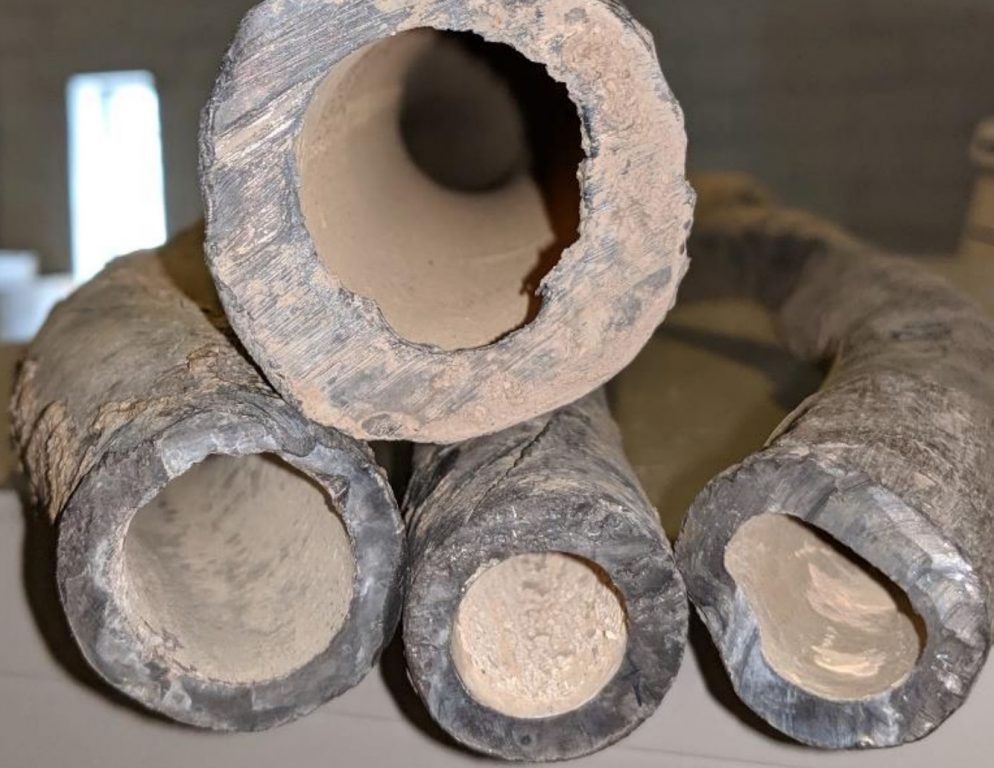Biden Plan Is a Lead Pipe Cinch
His infrastructure proposal could provide enough funding to replace all lead pipes in Milwaukee.

Lead service lines replaced by the Milwaukee Water Works with corrosion control visible in pipe. Image from Milwaukee Water Works.
One of Milwaukee’s biggest and seemingly most impossible-to-solve problems has been its lead pipes. The nearly 175-year-old city has about 75,000 of them under the ground, running directly into homes, schools and businesses, requiring an additional filter for people to consume clean drinking water. It is basic infrastructure, it is in a perpetual state of disrepair and there has been no end in sight.
Estimates for the cost to replace all of Milwaukee’s lead pipes recently ran as high as $750 million. The city was on a 70-year pace to get that job done, and the pandemic has only slowed things down. It’s not great.
President Joe Biden unveiled his new infrastructure bill on March 31. Other aspects of the $2 trillion proposal have drawn more attention — new passenger rail lines, rural broadband expansion, green energy initiatives — but the American Jobs Plan sets a goal for so unlike anything we’ve seen.
“President Biden’s plan will eliminate all lead pipes and service lines in our drinking water systems, improving the health of our country’s children and communities of color,” reads the White House fact sheet on the American Jobs Plan.
It can’t be overstated what this would mean for Milwaukee and cities like it. This is aging, basic infrastructure that is bringing toxins into people’s drinking water. It should no longer exist, period. Lead pipes are particularly hazardous to children and pregnant mothers, and childhood lead exposure has been linked to gun violence later in life. But because we have not had the political will to solve big, difficult problems for the better part of a generation, glaring problems like this one continue to worsen and metastasize into greater and greater crises.
The scope of the lead pipe problem in this country is truly massive. There are between six and 10 million lead service lines in the United States. The total investment in clean drinking water in Biden’s proposal is $111 billion.
With this proposal, the issue could be addressed all at once, and does so in a way that would put people back to work during a time of crisis on an issue that would otherwise have been largely ignored or met with half-measures.
But in Milwaukee, “we’re looking at a problem that’s going to stretch out over decades, not years,” David Strifling, director of the Water Law and Policy Initiative at Marquette University Law School, told me in a 2019 interview.
Until Biden’s proposal, the lead pipe crisis was turning out to be another problem without a solution, often for many of the typical Milwaukee and Wisconsin reasons.
At the city level, the problem was ignored and then mismanaged by Mayor Tom Barrett and his administration, leading to the high-profile resignation of longtime health commissioner Bevan Baker in 2018. Some city funding was eventually steered toward the problem and plans were put in place to begin the long process of replacing these pipes while providing some filters in the interim, but at a level nowhere near sufficient to address the issue. With Milwaukee’s finances being what they are, there are limited options to address such an issue without raising new revenue or making major changes to the city budget.
At the state level, Gov. Tony Evers proposed upwards of $40 million for replacing lead lines as part of his 2019 budget. But that proposal was removed by the Republicans running the state legislature. John Nygren, then co-chair of the Joint Finance Committee, nixed the proposal, saying too much money would go to Milwaukee.
He really, actually said that! And Assembly Speaker Robin Vos backed up those comments and the GOP-led state Legislature provided no alternative solution. Never mind that the money would have been proportionally distributed to the approximately 200,000 lead lines across the state. Since more than a third of that would be going to the state’s largest, most diverse city — a frequent target of Vos and the GOP’s scorn — it was worth throwing out entirely. It remains perhaps the most telling moment of how post-Walker Wisconsin would operate with Vos at the helm in the Legislature.
In 2020, Milwaukee’s city-level efforts run through the health department were forced to the back burner as the coronavirus pandemic upended the world, and progress stalled.
Now in 2021, Evers revived many of the proposals removed by Republicans in his 2019 budget — accepting the Medicaid expansion, education funding increases, etc. — but a fresh proposal on lead pipe replacement did not return this time around. It is perhaps the single most glaring absence from the governor’s proposed budget.
But perhaps there was a sense that federal help was arriving, one way or another.
As part of the American Rescue Plan — the covid relief bill passed by the Democratic House and Senate and signed by Biden on March 11 — some of the funding for the state of Wisconsin could go toward lead pipe replacement. And funding going directly to the city of Milwaukee could also go toward pipes, and Mayor Barrett said in a recent Milwaukee Courier Op-Ed that “lead abatement” (which could also include lead paint removal) would be a priority for those funds.
But none of that is final, and it wouldn’t meet the full scope of the problem the way Biden’s infrastructure bill aims to do.
So now, with the potential for the Democratically-controlled Congress to pass this infrastructure bill, the calculus for the state of Wisconsin and the city of Milwaukee could soon change. This issue could finally gain the federal help necessary to address this seemingly insurmountable problem.
The current estimates to solve Milwaukee’s lead pipe program is $750 million, and that’s less than one percent of the $111 billion total for clean water infrastructure in Biden’s proposal. And based on how some other cities are now repairing lead pipes, the cost could be much less than $750 million. With the federal government’s help — with this bill’s help — solving this problem is doable.
This would be a huge deal for this city, and so many others across the state and across the nation that have lead pipes carrying undrinkable drinking water to the faucet. We should be talking more about it. If this bill passes Congress, Milwaukee will have a brighter, healthier, safer future, free of lead pipes. Wisconsin’s congressional leaders from both parties should throw their support behind this bill.
This column was first published at The Recombobulation Area.
Dan Shafer is a journalist from Milwaukee who writes and publishes The Recombobulation Area. He previously worked at Seattle Magazine, Seattle Business Magazine, the Milwaukee Business Journal, Milwaukee Magazine, and BizTimes Milwaukee. He’s also written for The Daily Beast, WisPolitics, and Milwaukee Record. He’s on Twitter at @DanRShafer.
More about the Lead Crisis
- Gov. Evers Approves Bill to Support Lead Service Line Replacement in Superior - Gov. Tony Evers - Jul 1st, 2025
- MPS’s Westside Academy Cleared of Lead Risks After Stabilization Work - Milwaukee Public Schools - Jul 1st, 2025
- MPS Plans Lead Remediation at 40 Schools This Summer - Evan Casey - Jun 27th, 2025
- Baldwin, Reed Demand Written Answers from RFK, Jr. on Firings of Childhood Lead Poisoning Experts at CDC - U.S. Sen. Tammy Baldwin - Jun 11th, 2025
- MPS’s LaFollette School Cleared of Lead Risks After Stabilization Work - Milwaukee Public Schools - Jun 11th, 2025
- Sen. Baldwin Hears From Parents About MPS Lead Crisis, Chides RFK Jr. - Evan Casey - Jun 9th, 2025
- Reps. Margaret Arney and Darrin Madison Urge Joint Finance Committee to Reinstate Essential Lead Abatement Funding - State Rep. Margaret Arney - Jun 5th, 2025
- Gov. Evers, DHS Continue Administration’s Efforts to Combat Lead Poisoning Statewide with Permanent Rule - Gov. Tony Evers - May 27th, 2025
- RFK Jr. Claims ‘Team’ Is In Milwaukee Helping With Lead Crisis, Health Department Can’t Find Them - Nick Rommel - May 22nd, 2025
- MPS Announces Starms Early Childhood Center Is Cleared of Lead Dangers - Milwaukee Public Schools - May 21st, 2025
Read more about Lead Crisis here
Political Contributions Tracker
Displaying political contributions between people mentioned in this story. Learn more.
- March 30, 2016 - Tom Barrett received $100 from Bevan K. Baker
- August 29, 2015 - Tom Barrett received $25 from Bevan K. Baker
Op-Ed
-
Unlocking Milwaukee’s Potential Through Smart Zoning Reform
 Jul 5th, 2024 by Ariam Kesete
Jul 5th, 2024 by Ariam Kesete
-
We Energies’ Natural Gas Plans Are A Mistake
 Jun 28th, 2024 by John Imes
Jun 28th, 2024 by John Imes
-
Milwaukee Needs New Kind of School Board
 Jun 26th, 2024 by Jordan Morales
Jun 26th, 2024 by Jordan Morales






















This sounds like a promotion for the lead pipe removal and replacement industry. Milwaukee citizens should know that the relationship between lead poisoning and our drinking water is not clear cut. In many cases, paint chips or in-home plumbing may be the bigger problem. For another perspective, see:
“Urban Ideas: Fix Lead Poisoning, Not Lead Pipes” by Jeramey Jannene, Urban Milwaukee News reporter, 04/12/2021.
We do not want to spend millions of public dollars only to find the problem still exists and there is no money left to solve it.
I applaud the Biden plan to replace lead pipes. I live in a house that was built in 1905. We in our house are ready for new pipes.